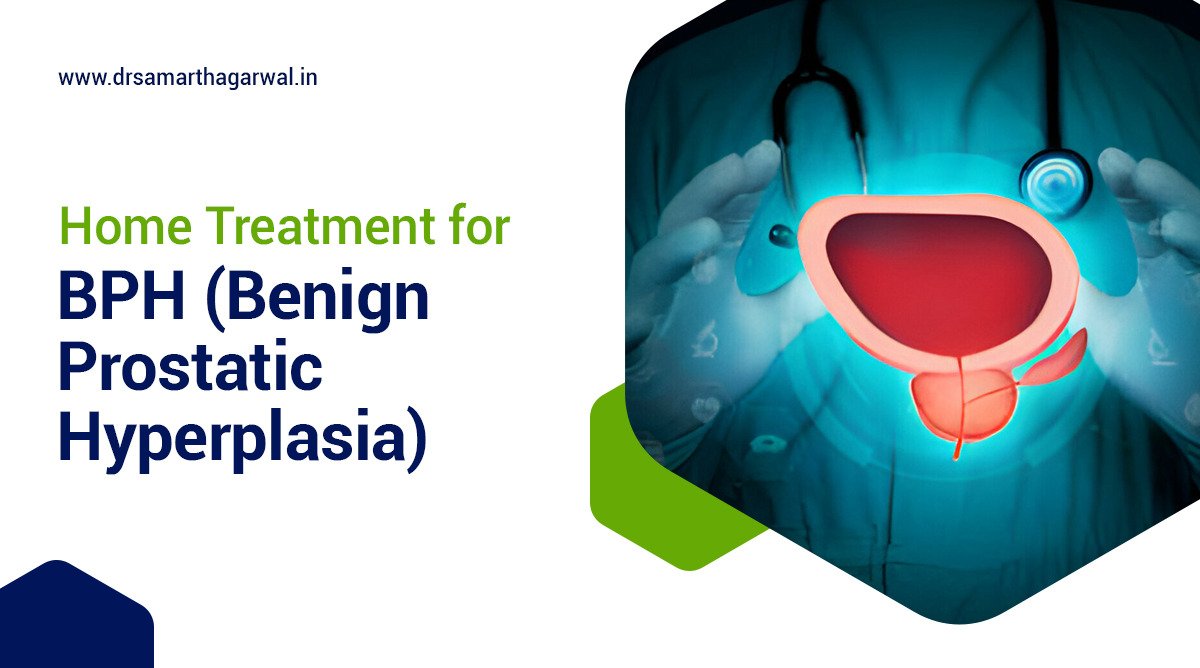Benign Prostatic Hyperplasia (BPH) is a common condition affecting older men, characterized by the enlargement of the prostate gland. Home treatment offers a viable approach to managing BPH symptoms without resorting to medical interventions. One notable aspect of home treatment involves addressing the symptoms directly, providing relief and improving the overall quality of life for individuals dealing with BPH.
Symptoms of BPH often manifest as frequent urination, especially at night, a sense of urgency, weak urinary stream, and difficulty initiating or maintaining urination. Home treatment aims to alleviate these symptoms, offering individuals a practical means of managing the impact of BPH on their daily lives.
Effectiveness is a crucial factor when considering home treatments for BPH. Research studies have shown promising results in using nutraceuticals and herbal remedies to address BPH symptoms. For instance, a 2019 paper published in the International Journal of Environmental Research and Public Health by AFG Cicero demonstrated the efficacy of polyphenols such as quercetin, equol, and curcumin in managing BPH symptoms through clinical studies
Can BPH be reversed naturally?
Benign Prostatic Hyperplasia (BPH), commonly known as an enlarged prostate, cannot be completely cured, but various natural remedies and lifestyle changes can help manage and alleviate its symptoms. Lifestyle adjustments such as regular exercise, maintaining a healthy diet, and staying hydrated, along with specific natural remedies like saw palmetto, soy, and pygeum, have shown promise in slowing or stopping prostate growth. However, consulting with a healthcare professional is crucial for tailored advice, as individual cases may vary. If experiencing BPH-like symptoms, prompt medical consultation is recommended for early detection and appropriate intervention.

While not all home treatments for BPH might work for you, but guidance from Siliguri’s own Urologist Dr. Samarth Agarwal would. Book a consultation with Dr. Samarth Agarwal here.
Top Home treatment options for benign prostatic hyperplasia
Kegel exercises
Kegel exercises are simple workouts beneficial for urinary symptoms like frequency, urgency, leakage, and loss of control. While they strengthen pelvic floor muscles, unfortunately, they don’t treat the underlying issue of an enlarged prostate, a common condition causing similar symptoms in men with BPH.
Kegel exercises, though valuable for pelvic health, don’t directly address BPH. The prostate’s enlargement triggers urinary symptoms, prompting the bladder to compensate. Kegels may alleviate symptoms but aren’t a cure. It’s crucial for men with BPH to explore treatments focusing on prostate health, such as medication, surgery, or minimally invasive procedures. Regular evaluation, especially during mild symptoms, can prevent complications like bladder failure. Kegels offer benefits like improved blood flow, reduced urine leakage, and enhanced sexual function but fall short in treating the core issue of an enlarged prostate. Effective BPH management requires comprehensive approaches tailored to individual needs, balancing effectiveness, side effects, and costs.
Saw palmetto (Serenoa repens)
Saw palmetto, with its plant-based chemicals, is believed to impact testosterone levels, potentially reducing the enzyme promoting prostate cell growth and exhibiting anti-inflammatory effects on the prostate.
Saw palmetto, derived from Serenoa repens, is theorized to modulate testosterone levels, potentially hindering the growth-promoting enzyme in prostate cells. Its anti-inflammatory properties on the prostate suggest efficacy in addressing benign prostatic hyperplasia (BPH) symptoms. Research indicates potential benefits, such as alleviating urinary symptoms, but results are inconclusive. Combining saw palmetto with lycopene and selenium may enhance its anti-inflammatory activity. Notably, the herb’s historical use for urinary tract issues aligns with contemporary focus on BPH. Understanding its mechanism requires further exploration, emphasizing the need for comprehensive studies to ascertain its effectiveness in managing BPH.
Beta-sitosterol
Beta-sitosterol, found in fruits, vegetables, nuts, and seeds, may help reduce cholesterol and alleviate symptoms of an enlarged prostate (BPH), improving urinary health.
Beta-sitosterol, a plant sterol, exhibits potential benefits for benign prostatic hyperplasia (BPH). Studies suggest it might limit cholesterol absorption, reduce swelling in the prostate, and improve symptoms. While Kegel exercises focus on pelvic floor muscles and urinary symptoms, they do not address prostate size. For BPH, more aggressive interventions like Urolift, Aquablation, iTind, Rezum, and HoLEP are common. Medication, surgery, or minimally invasive treatments like prostatic artery embolization (PAE) can help reduce prostate size. Kegel exercises, though beneficial for pelvic muscles, are not a direct solution for BPH. Consultation with a healthcare professional is crucial to explore suitable treatment options for individual cases.
Pygeum africanum (Prunus africana)
Pygeum africanum, derived from the bark of the African prune tree, has demonstrated efficacy in treating benign prostatic hyperplasia (BPH), reducing symptoms such as poor urine flow and nighttime urination.
Pygeum, an herbal extract from Prunus africana, has shown promise in alleviating symptoms of BPH. Its therapeutic effects involve inhibiting growth factors like epidermal growth factor (EGF) and insulin-like growth factor 1 (IGF-I). Clinical studies suggest it reduces BPH symptoms, including nocturia, frequent urination, and inflammation. Notably, research indicates potential benefits in slowing prostate cell growth. Although effective in symptom relief, more recent studies explore its role in treating the condition itself. Additionally, Pygeum’s anti-inflammatory properties may help prostatitis. While traditional uses suggest malaria and stomachache treatment, these lack robust scientific support. Dosages typically range from 75-200 mg daily, showing a satisfactory safety profile. Further research is needed to fully assess its effects, but Pygeum presents a promising alternative for BPH treatment.
Rye grass pollen (Secale cereale)
Rye grass pollen extract, such as Cernilton, is utilized as a home remedy for BPH by potentially reducing prostate pain and swelling. However, its effectiveness may vary, and it might not address all symptoms associated with an enlarged prostate, such as changes in urine production or sexual issues. How does Rye grass pollen (Secale cereale) function as a home remedy for BPH? gl:in
Rye grass pollen extract, commercially known as Cernilton, is derived from rye grass and is employed as a home remedy for Benign Prostatic Hyperplasia (BPH). Research suggests that it may alleviate symptoms like prostate pain and swelling associated with an enlarged prostate. The extract’s mechanism involves decreasing inflammation, interfering with certain chemicals, and potentially impeding the growth of prostate cancer cells. However, it’s important to note that while it might mitigate certain aspects of BPH, it may not comprehensively address all symptoms, such as changes in urine production or sexual concerns. It’s advisable for individuals considering this remedy to consult with healthcare professionals for personalized guidance. Additionally, other interventions like medication, surgery, or minimally invasive treatments such as prostatic artery embolization (PAE) are mentioned as potential approaches for reducing prostate size and relieving symptoms associated with BPH, highlighting a multifaceted approach to managing this condition.
Stinging nettle
Stinging nettle, rich in compounds like phytosterols, lignans, and polysaccharides, exerts anti-inflammatory and anti-tumor effects, relieving symptoms of benign prostatic hyperplasia (BPH). It compares favorably to medications like finasteride in slowing prostate growth.
Stinging nettle’s efficacy in BPH lies in its modulation of the immune system and relief of clinical symptoms. Clinical trials show a significant reduction in International Prostate Symptom Score (IPSS), serum PSA, and prostate size in BPH patients treated with nettle. Its safety, positive impact on symptoms, and patient acceptance make it a recommended herbal remedy for BPH. Surgical interventions like Urolift, Aquablation, iTind, Rezum, and HoLEP provide more aggressive options for severe cases. Regular evaluation and early intervention, especially when symptoms are mild, are crucial to prevent potential complications like bladder failure.
Lycopene
Lycopene, found in tomatoes and other sources, has shown potential in inhibiting benign prostate hyperplasia (BPH) progression, with improvements in symptom scores.
Research suggests that lycopene’s bioavailability, obtained through a healthy diet, contributes to its positive effects on prostate health. Clinical trials indicate reduced prostate-specific antigen (PSA) levels and inhibited BPH progression with lycopene supplementation. Additional studies explore the synergistic effects of lycopene and FruHis in managing BPH symptoms, emphasizing the importance of adequate dosage and patient factors such as age and BMI. While preventive effects on prostate cancer are debated, lycopene demonstrates promise as a natural remedy for an enlarged prostate, offering potential benefits in alleviating symptoms and supporting prostate health.
How to Choose the Right Urologist for You ?
Green tea
Green tea may benefit BPH by regulating DHT and PSA, promoting normal prostate size, and relieving urinary symptoms like frequent urination and nighttime urination.
Green tea, a widely consumed beverage, contains catechins with anti-inflammatory, anti-carcinogenic, and antioxidant properties. These catechins regulate DHT and PSA, contributing to a normal prostate size and volume. Green tea’s efficacy extends to relieving urinary symptoms associated with BPH, such as frequent urination and problems with urinary flow. The specific polyphenols in green tea, notably EGC, have shown promise in managing BPH alongside medications and other treatments. While research suggests potential benefits, it’s essential to continue prescribed treatments, maintain a balanced diet, exercise, and consult with a healthcare provider regularly. For men exploring holistic approaches to BPH, integrating green tea into their lifestyle, along with other interventions, may offer additional support.
Soy
Isoflavones in soy, such as genistein and daidzein, exhibit potential effects on benign prostatic hyperplasia (BPH). Research suggests that soy isoflavones may influence serum PSA levels and contribute to apoptotic activity in prostate tissues. While studies explore their impact on advanced prostate cancer (PCa), more research is needed. Incorporating soy into the diet might offer benefits, but individual responses vary. Understanding the phytoestrogenic nature of soy, particularly isoflavones, sheds light on its potential role in supporting prostate health. It’s essential to consider soy consumption as part of a holistic approach to managing BPH, consulting healthcare professionals for personalized advice.
Cranberry
Cranberry supplements have shown promise in reducing symptoms of benign prostatic hyperplasia (BPH), including decreased nocturnal urination, reduced urgency, and improved urine flow.
Cranberry, particularly in supplement form, has demonstrated efficacy in addressing lower urinary tract symptoms associated with BPH. A study in the British Journal of Nutrition reported improvements after 6 months of cranberry supplementation, indicating reduced nighttime urination, diminished urgency, and enhanced urine flow. Additionally, research on cranberry powder in rats suggested potential benefits in attenuating BPH by inhibiting 5-alpha reductase and reducing prostate weight and dihydrotestosterone levels. While further human studies are warranted, these findings highlight cranberry’s potential as a natural remedy for symptoms related to prostate enlargement.
Overactive Bladder Therapy Options
Can an enlarged prostate heal itself?
While there isn’t a cure for Benign Prostatic Hyperplasia (BPH), natural remedies and lifestyle adjustments may help manage symptoms. Studies suggest substances like beta-sitosterol could alleviate urinary issues, including improving urine flow. Lifestyle changes, such as double voiding and exercise, might slow or halt prostate growth. Consultation with healthcare professionals is essential to determine suitable interventions for individual cases.


